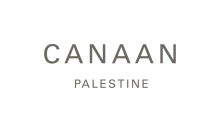
Contact: Website | Facebook | Twitter | Instagram
For Palestinians, the olive tree is lifegiving—it is a main source of food, its produce provides snacks that children have before going to school, its oil sits on every dinner table. Nasser Abufarha, founder of Canaan Palestine, wanted to preserve this vital, living thing by supporting the land it grows on and the farmers who harvest it, and sharing it with the world.
The first step was creating the Palestine Fair Trade Association. Abufarha introduced the policies of fair trade, from sustainability to ethical sourcing and just labor practices, to Palestinian farmers in 2004. Now, the association spans 54 villages and over 2,000 family farms in Palestine.
Then came Canaan Palestine, a certified member of the Green Business Network since 2007, intended to serve as a marketing and retail operation for producing and sharing organic Palestinian products like olive oil and tapenades.
In American culture, we say, 'This is my bread and butter.' In Palestine, our bread and butter is bread and olive oil.
Nasser Abufarha
Canaan Palestine employs many strategies to create its mouth-watering products as a green business. It begins with farming, and employing regenerative agricultural practices when growing and nurturing the olive trees.
“You have to respect Mother Earth and all these relations, and how you benefit from situating yourself within these life systems,” Abufarha says.
The intention of creating the Palestine Fair Trade Association, and then Canaan Palestine, was to address the specific issues farmers in Palestine face.
As Fatin Zahra, Business Market Manager of Canaan Palestine, adds: “We’re the underdogs. We don’t always have access to global markets unless there’s a platform that allows us to do that.
Before these two projects were launched, farmers had limited access to international markets, they were paid below market value for their olive oil, they were selling their olive oil for less than what it cost them to harvest their olives, many were unable to market and sell their olive oil, and a number of farmers were abandoning their farms to find more stable work with a steady income.
These were all brought on by the lack of organization in the industry, weak economy, the Israeli Occupation, Israeli land theft, restrictions on movement and trade, to just name a few.”
Both Abufarha and Zahra confirmed farmers abandoned their farmlands and gave up harvesting olive trees, moving on to something else because of the obstacles they faced and ruinously meager money they made.

Now, though, farmers are thriving and the olive tree, a symbol of Palestinian cultural identity, passed down from generation to generation, is being cared for in a way that ensures its continued longevity and health of the land.
“We are protecting the farmers in the marketplace from subsidized plantation products by addressing the disparities in price to the consumers and the conditions of production,” explains Abufarha. “As long as that relationship between farmers and the land is alive, that’s their strength.”
It’s the story of many small-scale farmers, Abufarha acknowledges, but with an added dimension given Palestine’s political occupation and systemic programs meant to exclude Palestinian farmers from the orchards on their land.
“They [political occupiers] are interested in the land and its fruits, but not the population that lives on this land,” he concludes.
But the future is bright for Canaan Palestine and the farmers.
Abufarha says: “Beyond protecting the olive crops, Canaan now invests in crop diversification to help regenerate biodiversity in the farms and diversify farmers’ income.”
“We’re also looking at working with new products like almonds,” Zahra adds excitedly. “This way we can add more opportunities for our farmers to have crops year-round and it’s not seasonal. Thanks to these projects, farmers can live more easily and fruitfully and build their communities.”


